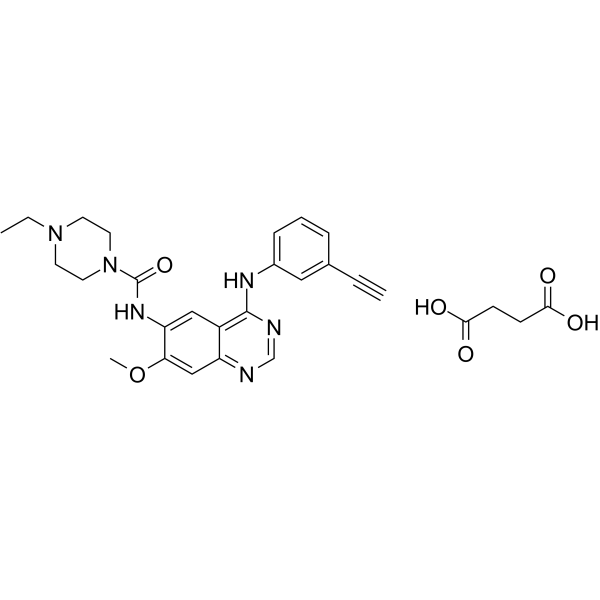
Epitinib succinate
CAS No. 2252334-12-4
Epitinib succinate( —— )
Catalog No. M28061 CAS No. 2252334-12-4
Epitinib succinate is an orally active and selective epidermal growth factor receptor tyrosine kinase inhibitor (EGFR-TKI) designed for optimal brain penetration. Epitinib succinate can be used for the research of cancer.
Purity : >98% (HPLC)
 COA
COA
 Datasheet
Datasheet
 HNMR
HNMR
 HPLC
HPLC
 MSDS
MSDS
 Handing Instructions
Handing Instructions
| Size | Price / USD | Stock | Quantity |
| 2MG | 152 | Get Quote |


|
| 5MG | 260 | Get Quote |


|
| 10MG | 430 | Get Quote |


|
| 25MG | 710 | Get Quote |


|
| 50MG | 972 | Get Quote |


|
| 100MG | 1332 | Get Quote |


|
| 500MG | 2673 | Get Quote |


|
| 1G | Get Quote | Get Quote |


|
Biological Information
-
Product NameEpitinib succinate
-
NoteResearch use only, not for human use.
-
Brief DescriptionEpitinib succinate is an orally active and selective epidermal growth factor receptor tyrosine kinase inhibitor (EGFR-TKI) designed for optimal brain penetration. Epitinib succinate can be used for the research of cancer.
-
DescriptionEpitinib succinate is an orally active and selective epidermal growth factor receptor tyrosine kinase inhibitor (EGFR-TKI) designed for optimal brain penetration. Epitinib succinate can be used for the research of cancer.
-
In VitroEpitinib succinate is an orally active and selective epidermal growth factor receptor tyrosine kinase inhibitor (EGFR-TKI) designed for optimal brain penetration.
-
In Vivo——
-
Synonyms——
-
PathwayOthers
-
TargetOther Targets
-
Recptorlysosomal acid lipase
-
Research Area——
-
Indication——
Chemical Information
-
CAS Number2252334-12-4
-
Formula Weight548.59
-
Molecular FormulaC28H32N6O6
-
Purity>98% (HPLC)
-
SolubilityIn Vitro:?DMSO : 12.5 mg/mL (22.79 mM)
-
SMILESN/A
-
Chemical Name——
Shipping & Storage Information
-
Storage(-20℃)
-
ShippingWith Ice Pack
-
Stability≥ 2 years
Reference
1.Rosenbaum et al (2009) Chemical screen to reduce sterol accumulation in Niemann-Pick C disease cells identifies novel lysosomal acid lipase inhibitors. Biochim.Biophys.Acta. 1791 1155
molnova catalog



related products
-
Taxifolin 3-O-glucos...
Taxifolin 3'-O-glucoside is a natural product from Chamaecyparis obtuse.
-
Scutellarein tetrame...
Scutellarein tetramethyl ether is extracted from Siam weeds and exhibits anti-inflammatory activity through NF-κB pathway.
-
Cerium(IV) sulfate t...
Cerium(IV) Sulfate is a reactant used in the synthesis of pyrazoles.



 Cart
Cart
 sales@molnova.com
sales@molnova.com


